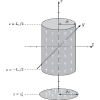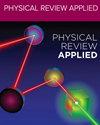Target-field design of surface permanent magnets
IF 4.4
2区 物理与天体物理
Q2 PHYSICS, APPLIED
引用次数: 0
Abstract
We present a target-field approach to analytically design magnetic fields using permanent magnets. We assume that their magnetization is bound to a two-dimensional surface and is composed of a complete basis of surface modes. By posing the Poisson’s equation relating the magnetic scalar potential to the magnetization using Green’s functions, we derive simple integrals that determine the magnetic field generated by each mode. This approach is demonstrated by deriving the governing integrals for optimizing axial magnetization on cylindrical and circular-planar surfaces. We approximate the governing integrals numerically and implement them into a regularized least-squares optimization routine to design permanent magnets that generate uniform axial and transverse target magnetic fields. The resulting uniform axial magnetic field profiles demonstrate more than a tenfold increase in uniformity across equivalent target regions compared to the field generated by an optimally separated axially magnetized pair of rings, as validated using finite element method simulations. We use a simple example to examine how two-dimensional surface magnetization profiles can be emulated using thin three-dimensional volumes and determine how many discrete intervals are required to accurately approximate a continuously varying surface pattern. Magnets designed using our approach may enable higher-quality bias fields for electric machines, nuclear fusion, fundamental physics, magnetic trapping, and beyond.

表面永磁体的靶场设计
我们提出了一种利用永磁体分析设计磁场的目标场方法。我们假设永磁体的磁化绑定在一个二维表面上,并由表面模式的完整基础组成。通过利用格林函数提出磁标量势与磁化之间的泊松方程,我们得出了确定每个模式产生的磁场的简单积分。通过推导优化圆柱面和圆平面上轴向磁化的支配积分,我们证明了这种方法。我们对支配积分进行了数值近似,并将其应用到正则化最小二乘优化程序中,从而设计出能产生均匀轴向和横向目标磁场的永磁体。由此产生的均匀轴向磁场剖面与最佳分离的轴向磁化对环产生的磁场相比,在等效目标区域的均匀性提高了十倍以上,这一点已通过有限元法模拟得到验证。我们用一个简单的例子来研究如何使用薄三维体积来模拟二维表面磁化剖面,并确定需要多少个离散区间才能精确地近似连续变化的表面图案。使用我们的方法设计的磁体可以为电机、核聚变、基础物理学、磁捕捉等领域提供更高质量的偏置磁场。
本文章由计算机程序翻译,如有差异,请以英文原文为准。
求助全文
约1分钟内获得全文
求助全文
来源期刊

Physical Review Applied
PHYSICS, APPLIED-
CiteScore
7.80
自引率
8.70%
发文量
760
审稿时长
2.5 months
期刊介绍:
Physical Review Applied (PRApplied) publishes high-quality papers that bridge the gap between engineering and physics, and between current and future technologies. PRApplied welcomes papers from both the engineering and physics communities, in academia and industry.
PRApplied focuses on topics including:
Biophysics, bioelectronics, and biomedical engineering,
Device physics,
Electronics,
Technology to harvest, store, and transmit energy, focusing on renewable energy technologies,
Geophysics and space science,
Industrial physics,
Magnetism and spintronics,
Metamaterials,
Microfluidics,
Nonlinear dynamics and pattern formation in natural or manufactured systems,
Nanoscience and nanotechnology,
Optics, optoelectronics, photonics, and photonic devices,
Quantum information processing, both algorithms and hardware,
Soft matter physics, including granular and complex fluids and active matter.
 求助内容:
求助内容: 应助结果提醒方式:
应助结果提醒方式:


